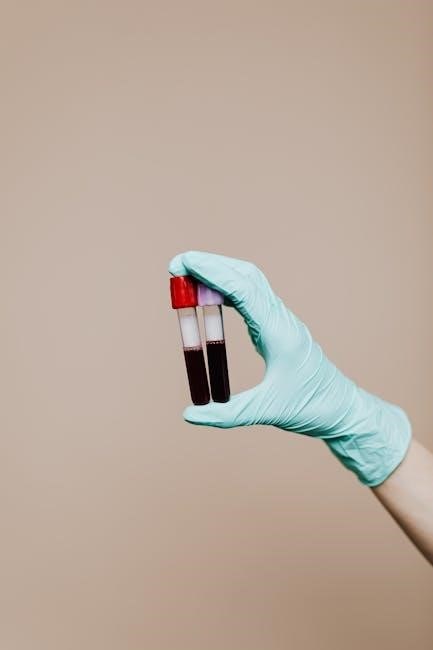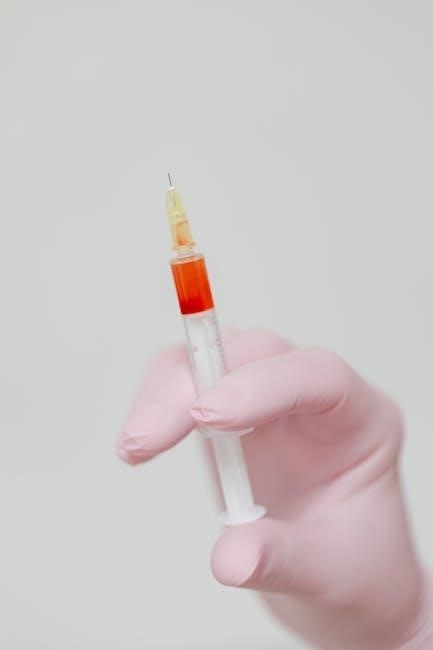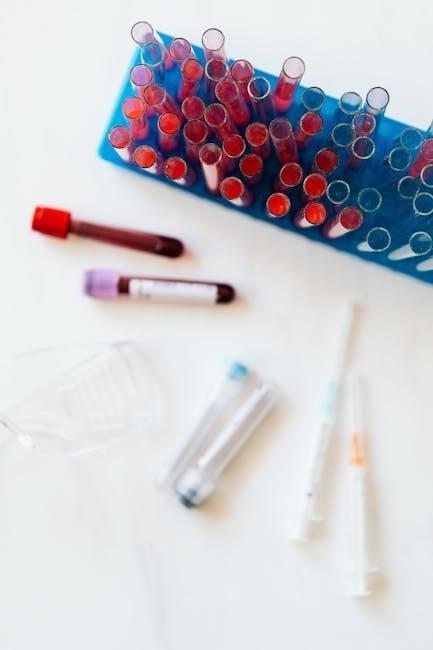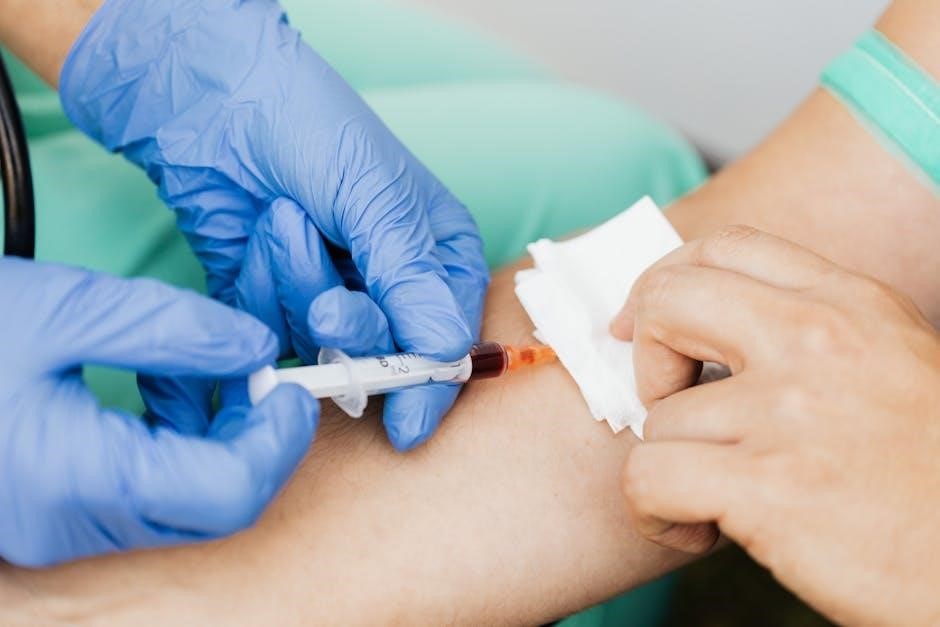Phlebotomy practice tests are essential tools for preparing for certification exams, offering realistic question formats and content. They help identify knowledge gaps and improve test-taking skills effectively.
Overview of Phlebotomy and Its Importance
Phlebotomy, the practice of drawing blood for medical testing, is a cornerstone of healthcare diagnostics. It ensures accurate blood samples are collected for timely and precise diagnostic results. Phlebotomy technicians play a vital role in patient care by performing venipunctures safely and efficiently. Their work directly impacts the diagnosis, treatment, and monitoring of diseases, making it essential for maintaining patient health. Proper techniques and knowledge of anatomy are critical to minimize discomfort and complications. By adhering to ethical standards and infection control protocols, phlebotomists contribute to high-quality patient outcomes. Their expertise is indispensable in clinical settings, emphasizing the importance of skilled professionals in this field.
How Practice Tests Prepare for Certification Exams
Phlebotomy practice tests are designed to simulate actual certification exams, helping candidates familiarize themselves with the format and content. These tests include multiple-choice questions, case studies, and scenario-based problems that mirror real exam scenarios. By practicing with these materials, individuals can identify knowledge gaps and strengthen their understanding of key topics. Regular use of practice tests enhances time management skills and reduces exam anxiety. They also provide opportunities to apply theoretical knowledge to practical situations, ensuring readiness for the challenges of the actual certification exam. Consistent practice builds confidence and ensures a thorough preparation for achieving success in phlebotomy certification.

Structure and Content of Phlebotomy Practice Tests
Phlebotomy practice tests typically include multiple-choice questions, case studies, and scenario-based problems. They cover key topics like blood collection procedures, safety protocols, and specimen handling techniques in detail.
Common Question Types in Phlebotomy Exams
Phlebotomy exams typically feature multiple-choice questions, true/false statements, and fill-in-the-blank exercises. Case studies and scenario-based problems are also common, testing practical application of knowledge. Questions often focus on blood collection procedures, safety protocols, and specimen handling. Some exams include identifying anatomical structures or equipment, while others assess understanding of pre- and post-phlebotomy care. Timing and prioritization of blood draws, such as for drug trough levels or emergency tests, are frequently covered. These question types evaluate both theoretical understanding and the ability to apply skills in real-world situations, ensuring candidates are well-prepared for certification and professional duties. Practice tests in PDF formats often mirror these question styles for effective exam preparation.
Key Topics Covered in Practice Tests
Phlebotomy practice tests cover essential topics such as blood collection procedures, patient preparation, and safety protocols. They include questions on vein selection, needle types, and blood collection devices. Topics also encompass specimen handling, labeling, and transportation. Knowledge of infection control, biohazard safety, and patient communication is frequently assessed. Anatomical understanding, including venipuncture sites, is a key focus. Additionally, tests address legal and ethical considerations, such as patient confidentiality and consent. Clinical scenarios, like handling difficult draws or adverse reactions, are also included. These topics ensure comprehensive preparation for real-world challenges in phlebotomy, aligning with certification exam requirements and professional standards. Practice tests in PDF formats often organize these topics for systematic review and mastery.

Benefits of Using Phlebotomy Practice Tests

Phlebotomy practice tests enhance knowledge retention, build confidence, and reduce exam anxiety. They familiarize candidates with question formats and improve time management, ensuring better preparation for certification exams.
Improving Knowledge and Confidence
Phlebotomy practice tests play a crucial role in enhancing both knowledge and confidence. By simulating real exam conditions, these tests help candidates familiarize themselves with question formats, including multiple-choice and scenario-based queries. Regularly engaging with practice tests allows individuals to identify and address gaps in their understanding of key topics, such as vein selection, blood collection procedures, and patient interaction. Additionally, these resources often include detailed explanations for correct and incorrect answers, reinforcing learning and retention. Over time, consistent practice builds confidence, enabling candidates to approach the actual certification exam with a clearer mind and improved problem-solving skills, ultimately leading to better test performance and success.
Reducing Exam Anxiety Through Preparation
Engaging with phlebotomy practice tests significantly reduces exam anxiety by familiarizing candidates with the exam format and content. These resources cover a wide range of scenarios, including patient interactions and blood draw techniques, helping individuals feel more prepared. By practicing under timed conditions, candidates can improve their pacing and reduce stress related to time management. Additionally, practice tests address common challenges, such as handling difficult patients or processing complex orders, which often cause anxiety. The more familiar one becomes with the exam structure and content, the more confident they feel, leading to a calmer and more focused mindset during the actual certification exam. Regular practice also helps identify areas for improvement, allowing for targeted study and reduced uncertainty;

Top Tips for Acing the Phlebotomy Exam
Use phlebotomy practice test PDFs to familiarize yourself with exam formats and content, ensuring you’re well-prepared for the certification process and confident in your abilities.
Effective Study Strategies
Utilize phlebotomy practice test PDFs to reinforce learning and identify knowledge gaps. Regularly review study guides and flashcards covering key topics like blood collection procedures and specimen handling. Practice under timed conditions to improve speed and accuracy. Focus on understanding the rationale behind correct answers to enhance retention. Engage in active learning by discussing challenging questions with peers or instructors. Prioritize areas where improvement is needed, and allocate study time accordingly. Consistency is key; dedicate specific periods daily to review and practice. By combining theoretical knowledge with practical application, you can build a strong foundation for exam success and professional competence in phlebotomy.
Time Management During the Exam
Effective time management is crucial during the phlebotomy certification exam. Allocate a set amount of time for each question to avoid spending too long on a single one. Skim through the entire exam first to identify easier questions and tackle them early, ensuring you earn those points quickly. For challenging questions, make educated guesses and move forward to maximize your score. Use the process of elimination to narrow down answer choices. Practice timed sessions using phlebotomy practice test PDFs to build stamina and improve pacing. Stay calm and systematic to ensure you complete all sections within the allotted time. Proper time management enhances your ability to demonstrate your knowledge effectively.

Free Phlebotomy Practice Test Resources
Access free phlebotomy practice test PDFs and online platforms for exam preparation. These resources provide comprehensive questions and answers to help you prepare effectively for certification exams.
Recommended PDF Guides and Online Platforms

Free phlebotomy practice test PDFs are widely available online, offering comprehensive study materials. These guides include practice questions, answers, and explanations, covering essential topics like blood collection procedures, safety protocols, and common phlebotomy techniques. Online platforms also provide interactive quizzes and mock exams, simulating real test environments. Many resources are updated annually to reflect the latest industry standards and certification requirements. Additionally, some platforms offer state-specific guides, ensuring preparation aligns with local licensing demands. These tools are invaluable for self-study and reinforce classroom learning. By utilizing these resources, aspiring phlebotomists can identify knowledge gaps and improve their test-taking skills effectively. Downloading these guides enables offline study, making exam preparation flexible and accessible.
State-Specific Requirements and Resources
Phlebotomy certification requirements vary by state, with some mandating licensure and others requiring only specific training or registration. To address these differences, state-specific practice test resources are available, ensuring alignment with local regulations. Many free PDF guides and online platforms cater to regional demands, offering tailored practice questions and study materials. These resources often include exam prep tailored to state-specific certification processes. Additionally, some states provide official study guides or partnerships with phlebotomy associations to facilitate preparation. Regular updates ensure these materials reflect the latest requirements and standards. By leveraging these state-focused tools, aspiring phlebotomists can better navigate regional certification processes and prepare effectively for their exams.